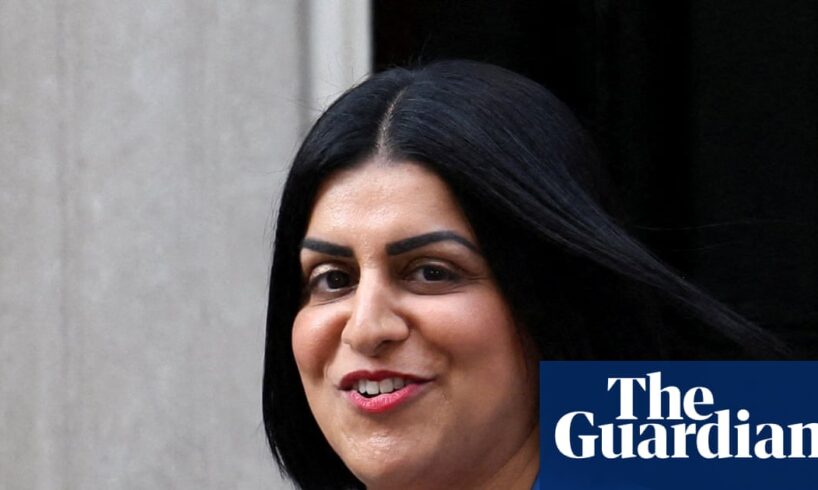
A series of senior female Labour MPs have dropped out of contention to replace Angela Rayner as the party’s deputy leader, as a compressed timetable for nominations and worries about a potentially toxic atmosphere narrowed the field.
Bridget Phillipson, the education secretary, is expected to enter the race, where she would be seen as a de facto Downing Street choice, potentially putting her against Emily Thornberry, who would position herself as a voice for backbenchers.
In a fast-moving process where hopefuls have until Thursday afternoon to secure nominations from at least 80 Labour MPs, four women tipped as possible frontrunners have already removed themselves from contention.
Shabana Mahmood said she wanted to focus on her new job as home secretary, which began on Friday after Rayner’s resignation as deputy prime minister and housing secretary over the underpayment of stamp duty on a second home.
“I’m the home secretary, so that is my job, and my top priority is securing our borders,” Mahmood told Sky News in a pooled interview. “I will not be running for deputy leader of the Labour party.”
Lou Haigh, the former transport secretary, had been expected to run as a candidate from the left.
But, writing in the Guardian, she said she had decided it would be better for her to campaign for a new and more ambitious approach by the government from the backbenches.
Jess Phillips, the safeguarding minister, and Lisa Nandy, the culture secretary, are also not standing.
While the reasons varied, at least one of the potential candidates cited worries about the pressure, as well as a possibly abrasive contest, and worries of a potential repeat of the scrutiny Rayner faced over her family and personal life.
Bell Ribiero-Addy, a south London MP who is close to Diane Abbott, is running as the candidate of the Labour left. Thornberry, the former shadow attorney general who was removed by Keir Starmer as Labour entered government, is widely expected to run and has already been gauging possible support among MPs.
Thornberry, who now chairs the Commons foreign affairs select committee, would be seen as an experienced and independent voice, and popular with members. However, she faces the hurdle that as with Starmer and David Lammy, the new deputy prime minister – a role separate to the Labour deputy leadership – she is a lawyer with a London constituency.
Phillipson, in contrast, represents a Sunderland seat and, like Rayner, grew up in a working-class family, although her cabinet role would bring accusations that she would not be able to properly represent the views of backbench MPs.
Another minister tipped to possibly run, who would also be seen as acceptable to Downing Street, is Alison McGovern, the former employment minister, who was moved to the housing and communities department in Friday’s reshuffle prompted by Rayner’s exit.
Even if the contest progresses smoothly, it is another unwelcome distraction for Starmer and his team after the chaos of Rayner’s departure and the reshuffle, the latest in a series of reverses for the government.
The PM was seeking to reassure Labour MPs on Monday evening, addressing a meeting of the parliamentary Labour party in parliament.
Other mooted contenders cited include Lucy Powell, who was removed as Commons leader in the reshuffle, as well as Stella Creasy, Sarah Owen, Anneliese Dodds, Dawn Butler and Meg Hillier, and figures from the left of the party including Richard Burgon and Nadia Whittome.
Burgon has not said if he wants to run but, speaking at the TUC conference in Brighton on Monday, he said there needed to be a candidate from the party’s left.
Any hopefuls will need to move quickly under the timetable set out by Labour’s national executive committee on Monday. MP nominations will open on Tuesday and potential candidates will have until 5pm on Thursday to gather 80 nominations, which is at least 20% of the parliamentary party.
Those who reach this threshold must also receive nominations from at least 5% of constituency Labour parties, or about 30 in total, or at least three official party-affiliated bodies, of which at least two must be unions.
The process for this second stage of nominations will run from 13-27 September, with the electronic ballot of party members – who must have been in the party for at least six months from Monday – taking place from 8-23 October. The result will be announced on 25 October.
One Downing Street insider said Morgan McSweeney, Starmer’s influential chief of staff, hoped to “flood the zone” with contenders so that very few candidates ended up making it over the 80 threshold, limiting the choice presented to party members.
Rayner served as deputy PM, but the party deputy leadership is separate to any government role and is voted on by members rather than decided by the PM.
While deputy party leaders almost always hold senior cabinet or shadow cabinet posts, a government source confirmed there was no rule saying this had to be the case, meaning the winner of the contest would not necessarily be made a minister if not one already.





